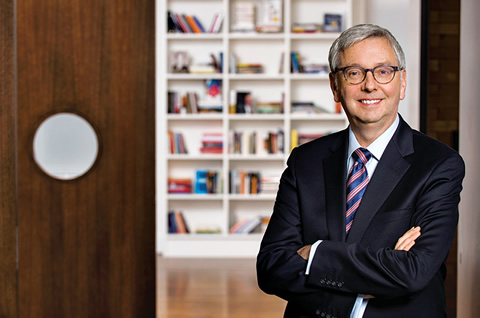Stephen Toope arrived at U of T last January to lead the Munk School of Global Affairs. Here he talks about his vision for the school, how it might solve global anxieties and the importance of Peter and Melanie Munk’s visionary gifts, which created the school and support its continued growth.
What attracted you to the Munk School?
My predecessor Janice Stein and her team did an amazing job transforming what had been an impressive but relatively modest centre of international studies into a school that has fantastic undergraduate and graduate programs, has carved out areas of global excellence in research and engages actively with the wider community – not just here in Toronto but across Canada and outside our borders. I really liked that mix. At the same time, it’s relatively new so there’s always more to do.
Where do you think the Munk School can have the biggest impact?
One area is innovation policy – how to foster business and social innovation – in economies like ours, but also in low-income countries. How do we construct new, efficient ways of delivering health care, electricity, and other services that address the needs of local communities and are respectful of their cultural values?
A second area where there is tremendous strength here is cybersecurity. What’s unique about the Munk School is that it’s not just thinking about how governments get hacked. Prof. Ron Deibert and his team investigate how repressive governments use technologies to prevent human rights activists, environmental activists and indigenous peoples from exercising their rights.
We have highly regarded regional studies groups in the Asian Institute, the Centre for the Study of the United States, and the Centre for European, Russian and Eurasian Studies. The interesting question for me is how we connect these to global concerns, such as the environment. How can the Munk School work collaboratively across U of T to address fundamental questions such as migration and refugees?
How does technology affect your thinking about the school?
We should be at the forefront in using the best information available about how adults learn and deploying the best technologies to teach our students. However, I don’t think technology provides all the answers to fundamental global challenges. Sometimes these challenges are more about political governance than they are about technological solutions. One of my issues with Silicon Valley is that too often we get seduced into imagining that the solutions to fundamental global challenges are all technological.
Peter and Melanie Munk made a gift to U of T to establish the Munk Centre, and again in 2010 to create the Munk School. How important is their philanthropy?
Absolutely crucial. Lots of people over many years had the vision to create a school of global affairs at U of T, but doing so required major philanthropic support. The Munks are passionately interested in the school and they are wonderful donors. They love hearing about our successes.
What do you see as the Munk School’s role in addressing the world’s most pressing challenges over the next 25 years?
There’s a great deal of anxiety in our societies around economics, inequality, terrorism and climate change. At the same time, technology and an unparalleled access to knowledge offer us more opportunities than we’ve ever had. How we use these opportunities to address the anxiety is perhaps the fundamental question for a school of global affairs.
I think is important for schools of global affairs and universities to admit that we don’t have all the answers. We don’t know what the great challenges are going to be 25 years from now. There was not a single Soviet expert who, in 1988 or 1989, said that the Soviet Union was going to collapse. No one got it right. Humility is really important and this means listening to communities outside of the university. Very often, universities share their knowledge. But this is only half the picture. We need to engage with our local community and with communities in different parts of the world and deeply listen as well as share our knowledge.
How do you see the Munk School evolving within the university?
Over the next few years, I hope the school can serve even more as a hub to bring people together to do interdisciplinary work and connect them with a wider set of communities.
What does success look like for the Munk School?
Helping to build the field of global affairs. Having great faculty members and great students. Contributing in tangible ways to improving people’s lives.
What do you like to do when you’re not thinking about the Munk School?
I read a lot of fiction. I’m also a huge classical music fan.
A shorter version of this Q&A appeared in the Autumn 2015 print issue.
Recent Posts
For Greener Buildings, We Need to Rethink How We Construct Them
To meet its pledge to be carbon neutral by 2050, Canada needs to cut emissions from the construction industry. Architecture prof Kelly Doran has ideas
U of T’s 197th Birthday Quiz
Test your knowledge of all things U of T in honour of the university’s 197th anniversary on March 15!
Are Cold Plunges Good for You?
Research suggests they are, in three ways





